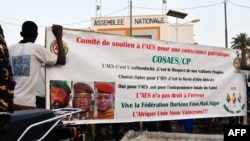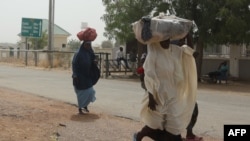Barricades initially put up in anticipation of an armed intervention by regional bloc ECOWAS still block the road linking Niger to Benin.
The political and economic standoff between Niamey and ECOWAS, which is demanding the release of deposed President Mohamed Bazoum and a return to constitutional order, has remained since the July coup that overthrew him.
The Economic Community of West African States (ECOWAS) announced late February it was lifting the most damaging sanctions, including a no-fly zone, border closures and asset freezes.
Niamey's traders say they are starting to see an improvement in electricity supply after a period of disrupted transport and shortages of power, food and medicine.
"Customers are coming in droves to get their hair done," said Mohamed, smiling outside his barber shop in the Dan Zama neighbourhood.
Economic fallout
Niger's main power supplier, Nigeria, cut off power at the time of the coup, causing blackouts that hit the economy.
"These months of electricity shortages have bankrupted us," said Ayouba Ali, a frozen chicken seller who has already placed new orders to get his business back on track.
The Nigerien Electricity Society "Nigelec" has been reconnected to the 820 kilometre high-voltage line between Niger and Nigeria since March, a source close to the Society told AFP.
"We have not had a power cut since last Friday," soft-drinks factory worker Saley Moussa said.
"Our factory is running at full capacity as we try to make up for the production losses caused by more than six months of disruption."
The West African Economic and Monetary Union (WAEMU) has also lifted sanctions, which included freezing Niger's assets and suspending financial transactions.
Customers had been forced to queue for hours outside the main banks to withdraw limited amounts of money.
"Banking transactions with foreign banks are now possible," a Niamey bank manger told AFP, although the payment of some civil servants' salaries was still behind schedule.
"Non-event"
Benin and Nigeria have reopened their borders, but Niger's remains closed.
The lifting of sanctions was intended to signal a willingness to renew dialogue with military regimes among ECOWAS members and came after Mali, Niger and Burkina Faso announced their intention to leave the bloc in late January.
After announcing the end of sanctions on February 24, Nigerian President Bola Tinubu urged the three countries to reconsider their withdrawal and to stop treating the organisation as an enemy.
His calls went unanswered. "I do not want to comment on a decision taken by an organisation of which Mali is not a member," said Mali's Foreign Minister Abdoulaye Diop.
The ECOWAS announcement was a "non-event," according to Niamey, which still considers military intervention by neighboring countries as a possibility, a government source said.
Economic pragmatism, however, suggests that borders should soon be opened.
Before the July coup, the Benin corridor handled 80 percent of Niger's freight through the port of Cotonou, some 1,000 kilometers (600 miles) from Niamey.
The port is also the terminal for a giant oil pipeline inaugurated in November, which should enable Niger to export 90,000 barrels of crude a day.
On Tuesday, a Niger delegation visited customs facilities on both sides of the border with Benin.
While airspace remains closed to flights to and from Nigeria, the pan-African airline Asky, based in Togo, and Air Cote d'Ivoire announced on March 2 that they were resuming flights to Niamey.










Forum